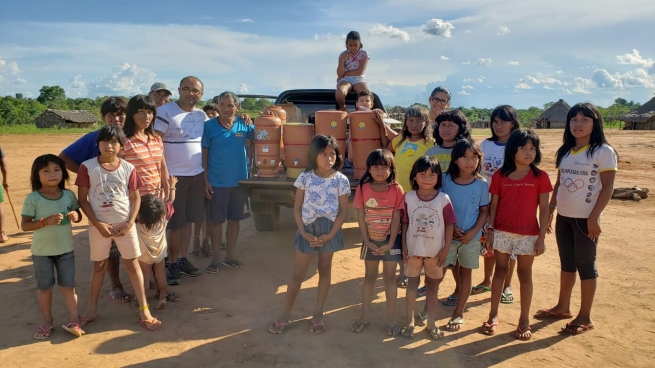BRAZIL: Donations of clay filters help indigenous populations have clean water during the rainy season

(MissionNewswire) Indigenous Xavante, who live within the 180 villages in the Brazilian state of Mato Grasso, are better able to treat their water and fight diarrheal disease thanks to a donation of clay filters. Currently, it’s the rainy season in the villages, which relieves the intense heat and brings better vegetation, but it also causes health problems for the local population who drink contaminated water.
Géssyca Santiago, a nurse and head of indigenous health service in Cuerpo de Cristo village, which serves close to 100 people, has detected a serious health problem. She said, “We have seen that cases of diarrhea in the community increase during the rainy season, because the river water, which they use for drinking, cooking, bathing and washing clothes, is very dirty and muddy.”
The inhabitants of some villages near Campinápolis already enjoy well water. Some of the wells were made by Salesian teams and others were created by the Special Secretariat for Indigenous Health. Families in the village of Cuerpo de Cristo, however, continue to survive only with water from the São Felipe river, which runs through the region.
To deal with the problem, Salesian missionaries have produced a series of guidelines on how to proceed in using water collected from the river. First, information and spoons were distributed so that people could learn how to make whey, which is used for the treatment of the disease. The donated clay filters were also distributed. These two initiatives managed to contain cases of diarrhea.
“It’s very sad that when we arrived in the village, we saw malnourished children, brought on by diarrhea, and we were not able to do anything. We left with an anguished heart. We fight so that children do not suffer from malnutrition, because once it is diagnosed, it is difficult to resolve,” said Deusmira Moreira, a volunteer.
The Salesian mission in Mato Grosso, which secured the donation, was appreciated by the community and the authorities. “It is a joy to be able to count on the support of the Salesians and of the health teams. Without this support, we are nothing,” explained Moreira. “I really want to thank the Salesians. With this help, we can do more and more. It is a great honor for me to be able to save lives. Not only those of children, but also of pregnant women and the elderly.”
The World Bank estimates that about 28.6 million Brazilians moved out of poverty between 2004 and 2014. But from the start of 2016 to the end of 2017, the World Bank estimates that 2.5 million to 3.6 million fell back below the poverty line earning less than 140 Brazilian reais per month. Economists blame high unemployment, near 13 percent, and cuts to key social welfare programs for challenges in the country.
Issues of income inequality and social exclusion remain the root causes for those in poverty. Inequalities also exist in access to education and educational efficiency. These inequalities are greatest for children and youth who are poor, live in rural areas or who have an incomplete compulsory education. Salesians working with poor youth and their families in Brazil develop programs and provide youth with opportunities for furthering their education and skills.
###
Sources:
ANS Photo (usage permissions and guidelines must be requested from ANS)
ANS – Brazil – Donations of clay filters alleviate suffering of Xavante natives in Campinapolis
Salesian Missions – Brazil
World Bank – Brazil





